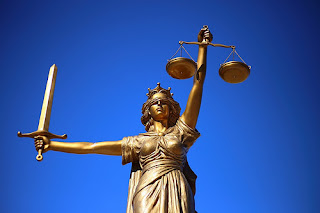While you undoubtedly assume a positive attitude going into
a case (or try to!), it’s hard to remain upbeat when things go wrong. That’s
when it’s good to remember that jurors identify with the Davids of the world,
not the Goliaths. He or she who maintains a positive outlook and courage in the
face of difficulties and long odds, wins favor with jurors. If, after all, you
face the unexpected challenges and pitfalls of your case with a positive
approach, you demonstrate by your refusal to be disheartened that your case is
truly worthwhile. Never stop looking for a way forward, for the pluses, the
upside of any situation.
That being said, do not confuse positivity with arrogance.
An arrogant attorney assumes that he or she will be victorious just by virtue
of being who they are. That attorney fails to support his/her conviction with
reality, and neglects to marshal facts, arguments and witnesses appropriately.
Always remain humble about who you are. Courageous on behalf
of your client, yes. Thinking you are better than everyone else, no. You are
the presenter (and interpreter) of the facts, that’s all. The jurors are the
most important people in the courtroom, always.


